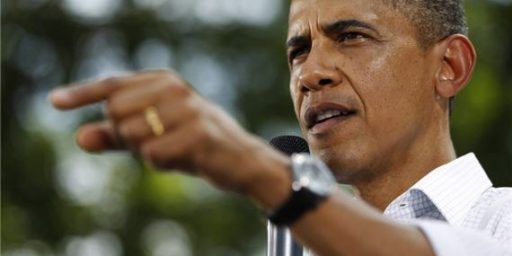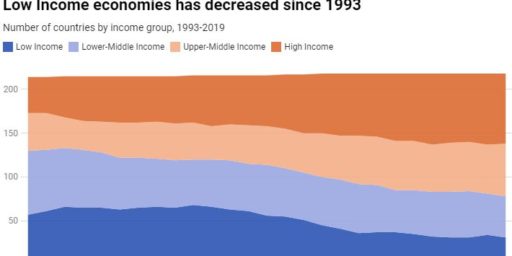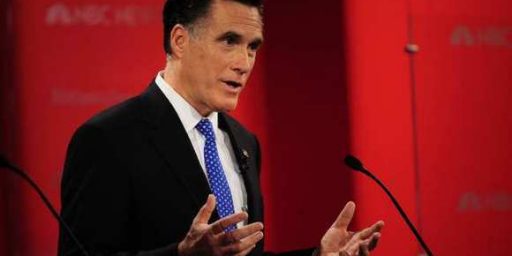POL 101: To Govern is to Redistribute
Is it possible to govern and not engage in some amount of redistribution?
As we mull the question of the tax compromise, the discussion over proper levels of taxing and spending continue as does the issue of the redistributive nature of such policies. On that theme, it strikes me as worth considering what we mean by “redistribution” as it seems that a lot of people simply think of it in stark terms such as confiscating wealth from the rich and giving it to the poor. However, the concept is a bit more complex than simply issues of welfare policy (or how one views them).
Any public good is one wherein there is almost certainly some amount of redistribution given that it is usually impossible that each citizens pays in the same in taxes as they receive back in benefits. Further, the nature of public good is that it is difficult to divide them into equal shares as some people benefit more from public goods than do others (and at different times). This is easily illustrated by roads—some use them more than others.*
However, without getting into the complex issue of public goods writ large, let’s consider the ways in which redistribution takes place under basic governance apart from just transfers to the poor.
Take public education as an easy example to illustrate what I am talking about: Three families live on the same block in the same neighborhood in houses of roughly the same value and therefore pay roughly the same in property taxes. One family has three children, another has one and the other has none. Now, all three families receive the general public good of living in a society with a literate citizenry and the likewise the businesses/organizations** have access to an educated population. However, there is little doubt that the families with children receive more direct benefits from the public schools than does the family sans kids and, further, one family received three times the benefit of the one with only one child. This is, by definition, shared costs by all involved that redound more to one sets of citizens than it does to others.
Consider another example: a small, walled city-state needs to hire night watchmen to guard the gates at night to protect the citizens within the walls. To pay those watchmen, the city extracts a flat fee of a few dollars a month per household. Now, on the the one hand, this is the height of fairness, yes? Everyone pays the same amount. However, on the other the actual value of the service provided accrues far more to the wealthy than to the poor. Sure, the whole city receives protection, but the value of that protection is far larger for the rich, who have more to protect and who would be the likely target of the brigands kept at bay by the diligent watchmen. And there is also the pesky fact that the poor have a difficult time paying the monthly fees whilst to the wealthy it is no big deal. Surely in such a situation there is a disproportionate value being provided to the wealthy is such a case and therefore represents an upward redistribution of value up to them. The usage of the flat fee here is illustrative of the fact that even when costs are the same, the benefits may not accrue to all in equal measure. Even if there is some progressive tax based on income level, is there not still more value attached to the protection afforded the wealthy than that afforded the near destitute in this scenario?
It must be understood that there is a difference between the fact that some people will receive more benefits from government than they pay for and the notion of income leveling (i.e., radical redistribution that would make everyone economically the same-at least in theory). Indeed, the entire discussion of fiscal policy is one that cannot ignore these issues and to pretend otherwise is to ignore the fundamentals of government.
Therefore, the issue is not whether a government should redistribute or not, but rather what will is redistribute, how much and to what end.
My point in a nutshell: it is impossible to set up a government in which everyone pays in the same amount and receives back the same measure of benefits. Given that, the debate is about the mix of the two and it is complicated mix at that.
______________________
*This is true not just in terms of how many miles a given person commutes each day, but it terms of things like whether a given person is prone to buy more products shipped from greater distances than another person or whether one’s source of income is more, or less, dependent on the roads.
**Whether they work in government, a church or some nonprofit enterprise.







I suspect that when people argue against redistribution, they are arguing either that:
1) Some redistribution is appropriate and desirable, but current policy is too redistributive, or
2) Redistribution should be an incidental effect of efficiently providing public goods, not a positive policy goal in itself.
Well, I would think that the far right and libertarians don’t want anything. They just want their money and everything can just fall apart. The interstate is one example of redistribution. We all benefit from rich to poor. It creates commerce and tourism. And we all paid for it. It made our country better. You can ship good faster. The internet (from the government) again shows how commerce, the poor, and the rich have benefited. In fact, you can look at Amazon and people got rich. And in reverse order the low income people paid for that too. We wired our country for telephone and electricity. We need to cover most the country with high speed internet. All people and the country benefits with this kind of redistribution. We need massive vocational and retraining programs to get people employed because of globalization. And this is good for our country as you need employed people paying taxes and not be on welfare. We need the government to invest more in science and technologies for our future employment and we all benefit from that.
I suppose a lot of rail in Europe is subsidized. But they benefit also from American and other tourists who ride the trains. Tourism reigns in Europe with this network.
Heck even if we look at Queen Elizabeth, she gets millions from the state. But in return you get tourist dollars.
Eric Rall had it right with number 2. It amazes me that the right would have things fall apart and not have the country governed. I guess that is why in the past, I have said, democrats may be dumb, but republicans are a bunch of nuts.
The current argument over tax cuts ignores all our problems. So the tax issue means nothing in fixing our current problems. It is ideology gone wild and it is ruining our country.
Where the line should be drawn is the question. Much of the country thinks smaller government and less redistribution would serve us all better.
The thing is (and apart from whatever my own preferences may be), I am not at all convinced that this is true. What is it that you think that people actually want cut (aside from waste)?
I think that people, in a generic sense, want the things you list, I am far from convinced that once the details are on the table that it is true–indeed, not even close.
We should be able to look at tax in the vast historical context. In another thread Zelsdorf asked “When did government gain the right to my money?” My answer was “about 3,000 years ago.”
Roads, canals, police, armies, disaster response … all that old.
Otto von Bismark gave us a lot of innovation in the 1880’s
Health Insurance Bill of 1883
Accident Insurance Bill of 1884
Old Age and Disability Insurance Bill of 1889
I guess the century (and a fraction) since hasn’t been enough for the details to be hashed out.
For what it’s worth, I think Bismark nailed it on 20 March 1884:
(wikipedia)
No restribution, no army, no roads, no police, and pretty soon no country. Seems pretty straightforward.
And in fact the Republicans have been as enthusiastic redistributers as the Democrats, as can be seen in how readily they redistribute money from citizens to military. Its not really an argument about the principle, just about the details, with a fair amount of sematics thrown in.
“I am far from convinced that once the details are on the table that it is true–indeed, not even close.”
Keep the government out of my Medicare!
Could we all at least agree that redistribution has gone too far,”
When all men are paid for existing and no man must pay for his sins” to quote Kipling…..
Dr. Taylor,
That’s the trick question used so often, what would the people want cut? First I would point out a good portion of the money being spent was never proposed by the citizens to start with so why is it now their responsibility to find the cuts? Who created the problem? The political class at all levels of government. They should be tasked with finding the cuts.
But just to be fair let me give some examples. In my town we recently built a bicycle pedestrian bridge that cost $2.1 million. Next door another town just received over $1 million to beautify a street. Then there was the $360,000 to widen a road for a bike lane that didn’t connect to anything. Now that’s chicken feed to say the least but multiply that by all the communities across the nation. This is just a sample of the road projects with extravagant spending. Imagine adding in the spending from other agencies.
No one wants to take that first small step toward fiscal discipline. Start with the small steps and build. Next look at things like raising the retirement age and controlling medicare/medicaid costs. Like the debt those future changes will be easy to swallow since we don’t face it today, people have time to adjust. It can be done and must be done.
Hard choices can be made by those with principle and conviction. Our politicians have gotten us into this mess and they should get us out.
@Steve:
If asking what needs to be cut is a “trick question” then I am not sure what that a conversation is even possible.
And no, “the people” as an entity didn’t propose these things, but their elected representatives did, and therefore the people have responsibility in the process. Further, and this is key, while you may think that the bike path in question was ridiculous (and perhaps it was) there were also other citizens, with equal standing as you, who thought it was a great idea.
I have not problem, btw, with starting small. The problem still remains as to building a consensus as to what that means.
@Steve T:
“I think that people, in a generic sense, want the things you list, I am far from convinced that once the details are on the table that it is true–indeed, not even close.”
From, Poll Finds Tea Party Backers Wealthier and More Educated
The old liberal argument, you must be for all government and redistribution or you must be against all government and redistribution. That is clearly a flaw and B.S. argument.
Dr. Taylor,
A conversation is possible as long as we can be frank. It has become a trick question because it ignores a number of important facts. I mentioned the first problem of how politicians use it to avoid their responsibility to govern in a responsible manner. Remember as well any suggestions for cuts must then go right back through those same politicians who can simply say there was no public support. Funny thing is none of these cuts have even been attempted so how do we know the public outcry will be so great? You see? They always use it as an excuse before actually putting a sound proposal forward.
Back to the bike path, bridge, or whatever public work projects may be at issue. In my years of experience on various public committees and commissions I have seldom seen these projects initiated by citizens but rather in almost all cases it was the agency benefiting from the project who pushed it. The bridge in question was not brought about through a petition or people speaking to the city council but it was a transportation planner who knew there was money available and thought it would be a good idea to get some of it. It happens thousands of times a day across the country. Blaming the citizens just doesn’t work.
The Deficit Commission had some real ideas but politicians soon shot it down. Why? Were there protests in the streets? No. Calls to congress critters jamming the lines? No. The political class just didn’t want to take any potential heat down the line. Again blaming the citizens instead of taking responsibility.
The disconnect has grown too large between citizens and their elected representatives for this to always go back to the citizens. When they finally form something of an organized front against deficit spending it’s ridiculed by the political class, academics, and those who prefer the present spending levels. In many cases, like my own Senator Wyden, they don’t even reside in the state any longer. Throw in the lobbyists and government bureaucrats that have their ears and representative democracy is not nearly representative enough to blame citizens for the spending and debt.
From whom will they take the heat?
I do agree, by the way, that much of the feedback loop is broken (the filibuster in the Senate is an easy example, although there are a host of other problems as well that are even more difficult to reform).
Sounds like yet another argument for smaller government.
“Hard choices can be made by those with principle and conviction. Our politicians have gotten us into this mess and they should get us out.”
I’d say the people who hired those politicians are the ones who got us in the mess … and will have to be the ones to get us out. And that means electing people who will do so.
As it is, neither party is willing to make any cuts in either things they hold dear to their hearts (military for republicans, social programs for democrats), or things that can cost an election (medicare for both). And so long as they keep getting elected, why change?
“A conversation is possible as long as we can be frank. It has become a trick question because it ignores a number of important facts.”
Absolutely right. Among them is this idea that infrastructure products contain the fat from which we should cut.
“The disconnect has grown too large between citizens and their elected representatives for this to always go back to the citizens”
Steve, I give you the essential contradiction in your preferred party’s method of operation:
The only politician who will ever cut the debt is the politician who cares more about cutting the debt than keeping their job, and if there’s one thing the Republican Party cares about more than anything, it’s winning the next election.
As for governing, they seem totally uninterested in it.
Herb — utter bullshit. Grow up and stop imagining the other side is stupid, evil and incompetent. Really.
I don’t have to imagine too hard. The Republicans just won a majority in the House and made in-roads in the Senate. Listen to the Republican leaders. Are they going to start working on the Tea Party’s to-do list, shoving through legislation with the help of the Blue Dogs?
Nope. The Republican leadership, almost to a man, has their eye set on winning the 2012 elections and being a general pain in the neck in the meantime. If that’s what you want, you got it.
But I suspect most Republicans want a bit more. Here’s two years to start working for it.
Wow, politicians are interested in winning elections. Brilliant insight. But only Republicans. Democrats are above such petty self interest and only want to do the right thing. You might be interested in Doug’s latest post about 2012 primary chall;enges to Obama.
See a previous comment about being yet another argument for smaller government, but I digress.
“You might be interested in Doug’s latest post about 2012 primary chall;enges to Obama.”
As if that will go anywhere…and while it is true that all politicians are interested in winning elections, the current dynamic exposes for all to see how hypocritical the GOP really is, whining and complaining so much about how they want to balance the budget and be fiscally responsible, and yet, cutting a deal that will make the budget deficit even worse…I mean, really, where is a “real conservative” (or a libertarian) supposed to go for real representation…
All I will add is this: We are $14 TRILLION in debt! Our politicians are redistributing (for good or ill) my (and your) children’s and grandchildren’s tax dollars through a loan from the Chinese (primarily). My tax dollars were spent a long time ago.
This should not be a Rep/Dem issue or rich/poor issue, it is about economic insolvency. If there is no more money, it can’t be earned or redistributed to anyone. Tough decisions need to be made…it won’t be pretty.
“Wow, politicians are interested in winning elections. Brilliant insight. But only Republicans. Democrats are above such petty self interest and only want to do the right thing. ”
Weird. I don’t think I said anything about Democrats. But I can see why you think my criticism of Republicans is some kind of absolution of all things Democrat….because, after all, if you don’t buy into “the cause” 100% you’re either a RINO or a communist*.
* Communist, Democrat…..same difference.